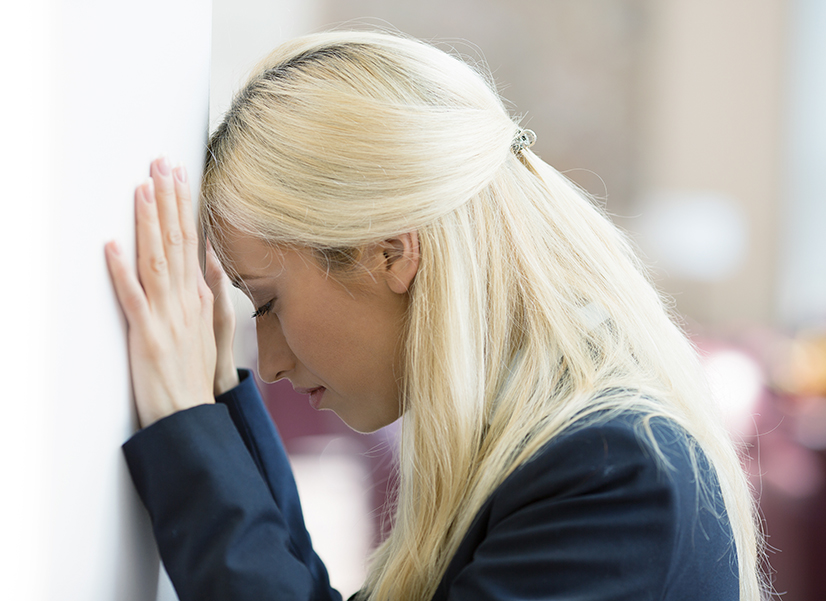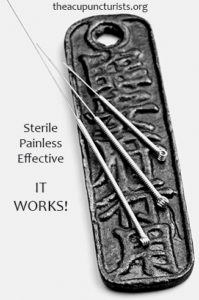
By Robert Herbst AP, DOM – Margate, Florida – Anxiety and related disorders are a real problem in the US, affecting over 40 million people over the age of 18. This number is actually believed to be a conservative estimate, as a lot of patients are misdiagnosed or even completely unaware that what they are experiencing is anxiety.
Young people, especially, know what they are feeling is not right but are unable to adequately describe it. The more worrying statistic is that 70% of those who attempt suicide suffer from some form of anxiety (Appleby L, (1994).
What is anxiety?
WebMD opines that anxiety is a state of worry, panic or unease that encompasses people over stretches of time. It at times escalates into more serious states such as panic disorder and extreme social discomfort leading to agoraphobia (fear of public places). Research strongly suggests that anxiety is not random – it is created from physiological and psychological states that manifest, usually due to stress or other external or internal factors.
The good news is that acupuncture and Chinese herbal medicine can effectively reduce the symptoms of panic, and anxiety, helping those affected to lead normal lives. Before we delve into acupuncture and Chinese medicine let’s go over the symptoms and typical treatments for anxiety.
Symptoms of anxiety
There is a diverse number of anxiety disorders, and they include Agoraphobia (fear of places), generalized anxiety disorder (activities or events) post-traumatic stress disorder (as a result of trauma) and a wide range of phobias.Here is a look at some of the symptoms:
- Feelings of foreboding and generalized fear
- A problem with focus, brainfog
- Breathing difficulties, oppression of the chest
- Tension and worry (sometimes without good reason)
- Profuse Sweating
- Muscle twitching
- Lethargy and fragility
- Obsession with certain actions
- Digestive complications, including nausea and vomiting
Western Medical Treatments for anxiety
Medication – If a physical ailment is causing anxiety, doctors focus on treating that ailment directly. However, the most common approach is to use medication that handles the mental and physical symptoms. Said medication could involve beta blockers, antidepressants, tricylics and benzodiazepines. They work at times, but usually with unwanted side effects.
Mental health Counseling – Beck AT (1970) says that this takes the form of therapy, with the professional choosing to go with one or a combination. The most common of these is Cognitive Behavioral Therapy (CBT), which helps patients do away with distorted thinking and adopt a focused behavioral lean.
Relaxation exercises – These exercises allow you to relax the muscles you suspect to be the cause of your anxiety in specific situations. It works best for agoraphobia and typically needs to be administered once a week for four months.
Acupuncture and TCM vs Anxiety
 Acupuncture and Traditional Chinese Medicine approaches consider the energies of heart, spleen and the kidneys as the areas of focus when it comes to anxiety treatment. Each of these parts is connected to an emotion. For example, the spleen is associated with worry, the heart with joy and the kidney with fear .When you are anxious, the three emotions put your Shen (spirit) under constant pressure, and you find it hard to function.
Acupuncture and Traditional Chinese Medicine approaches consider the energies of heart, spleen and the kidneys as the areas of focus when it comes to anxiety treatment. Each of these parts is connected to an emotion. For example, the spleen is associated with worry, the heart with joy and the kidney with fear .When you are anxious, the three emotions put your Shen (spirit) under constant pressure, and you find it hard to function.
When the spleen is ‘worried’, it is not capable of filtering the products of blood and tissue fluid. If your heart is not in line with your core, then the flow of energy is also disturbed. Kidneys also need to be at their best because the underlying idea is that all of these organs are an intricate part of a whole. In fact, the kidney is most affected by stress and anxiety when your energy is not flowing right.
Acupuncturists will attempt to “calm your shen” by placing thin, sterile acupuncture needles at the right points, and this sets in motion a number of steps that help to activate the body’s natural, self-healing processes. Acupuncture works by regulating neurotransmitters in the brain (much like antidepressants), as well as by stimulating the release of endorphins, the feel good hormones that ease tension, leading to calm and relaxation (Liu GZ&, Guo LX, 1998).
What Acupuncture research studies say about its efficacy with anxiety
In a CNS Neuroscience and Therapeutics review, it came to light that acupuncture works in similar ways to Cognitive Behavioral Therapy (CBT). CBT is a major tool in Western anxiety treatments (Errington-Evans, 2011).
A 2013 study in the Journal of Endocrinology gave a blow by blow account of an experiment to carry out acupuncture on mice, and the results were a vindication of a long held view; stress levels decrease after consistent sessions of acupuncture.
The Anxiety and Depression Association of America (ADAA) is of the opinion that over the years, more and more irrefutable evidence has started to surface, and the import is that acupuncture is actually as good as advertised.
Start Feeling Better Today!
If you are suffering with anxiety let us help. We have personal experiences to testify for the effectiveness of acupuncture and herbal medicine, and we have helped countless patients overcome their anxiety to lead normal lives once again. Call us today to get started!
Learn more about Acupuncture and Psychology
References
- https://www.psychologytoday.com/blog/renaissance-woman/201509/acupuncture-stress-and-depression-yes-please
- http://www.webmd.com/anxiety-panic/
- Appleby L. Panic and Suicidal Behaviour. British Journal of Psychiatry. 1994; 164:719–721
- Beck AT. Cognitive therapy: Nature and relation to behavior therapy. Behavior Therapy. 1970;1:184–200.
- Nick Errington-Evans, acupuncture in adults with chronic, non-responding anxiety symptoms, Acupuncture in Medicine, 2015, 33, 2, 98
